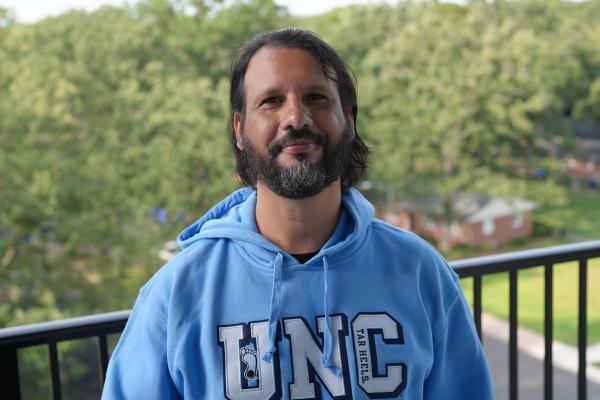
FPG welcomes visiting scholar Lucelmo Lacerda
The UNC Frank Porter Graham Child Development Institute (FPG) conducts interdisciplinary research, evaluation, implementation, technical assistance, and outreach in pursuit of positive outcomes for children and families—locally, nationally, and worldwide. The Institute partners with people around the globe and welcomes opportunities for those colleagues to collaborate with us as visiting scholars here in Chapel Hill.
The Institute is pleased to welcome Lucelmo Lacerda, PhD, a visiting scholar who will be working with FPG senior research scientists Sam Odom, PhD, and Ann Sam, PhD. We recently spoke with Lacerda to learn more about his work and his path to FPG—here’s what he had to say.
Tell us about yourself and your academic and professional journey.
I am a history teacher and worked for 14 years in elementary education (until 2023). I earned my master’s degree in social history and later completed a PhD in education, both from the Pontifical Catholic University of São Paulo. During that time, I became increasingly interested in evidence-based practices in education, especially in the field of special education. During my postdoctoral research at the Federal University of São Carlos, I focused on the skill sets of resource room teachers working with autistic students, and on applied behavior analysis (ABA), which serves as the conceptual foundation for most evidence-based practices that support autistic students in inclusive educational settings.
You use social media to disseminate and discuss evidence-based practices in your field—can you elaborate on this? And what results/impact are you having by using this modality?
Back in 2017, I began actively promoting evidence-based practices related to autism in Brazil. At the time, I started by using Facebook and later added Instagram and TikTok. Today, I’ve built a community of about 900,000 followers who engage with me on this topic.
I create videos that explain key studies, debunk harmful myths (such as the false claim that vaccines cause autism or the damaging trend of self-diagnosing via social media), interpret professional guidelines in accessible language, and comment on news related to autism and education.
I hear countless stories about how this work has positively impacted people’s lives, such as individuals who received a diagnosis after watching my videos, parents who were able to secure treatment for their children after showing a doctor one of my posts, teachers who transformed their classrooms through strategies they learned, and city governments that developed policies improving school inclusion—among many others.
How did the opportunity to work with FPG come about?
The primary source of my academic studies has always been the work produced at FPG, especially the National Clearinghouse on Autism Evidence and Practice (NCAEP), as well as numerous publications by Professor Odom, who developed the framework that made this initiative possible.
What do you hope to accomplish over the next year working with FPG?
My integration into FPG is still in progress, as we align the research projects to which I’ll contribute here. However, I’m already working on a project to disseminate AFIRM—Autism Focused Intervention Resources and Modules—in Brazil, which is incredibly exciting, as bringing FPG’s work to a broader Brazilian audience is one of my main goals during my time here.
Also, I hope to contribute to meaningful research at FPG, increasing both the quantity and quality of my academic output. More importantly, I aim to build a strong connection with FPG so that I can continue collaborating even after returning to Brazil. I also plan to conduct research in Brazil and expand the reach of evidence-based practices there, while continuing to use my social media platforms to share and promote FPG’s work.
What does the future hold for your work beyond that? What do you hope to be working on over the next five or more years?
If all goes well, I hope to remain a productive contributor to FPG and help shape public education policy in Brazil—especially to expand the role of evidence-based practices in education, with a particular focus on the inclusion of autistic students.
Is there anything else that you would like people to know about your work?
I’m deeply passionate about my field of study. The concept of evidence-based practices has transformed my understanding of education—and of the world. As a teacher in the classroom, my perspective on education was once vague and abstract. A scientific lens gave me exactly the clarity I needed—and now, my goal is to help that vision grow and reach as many people as possible.
